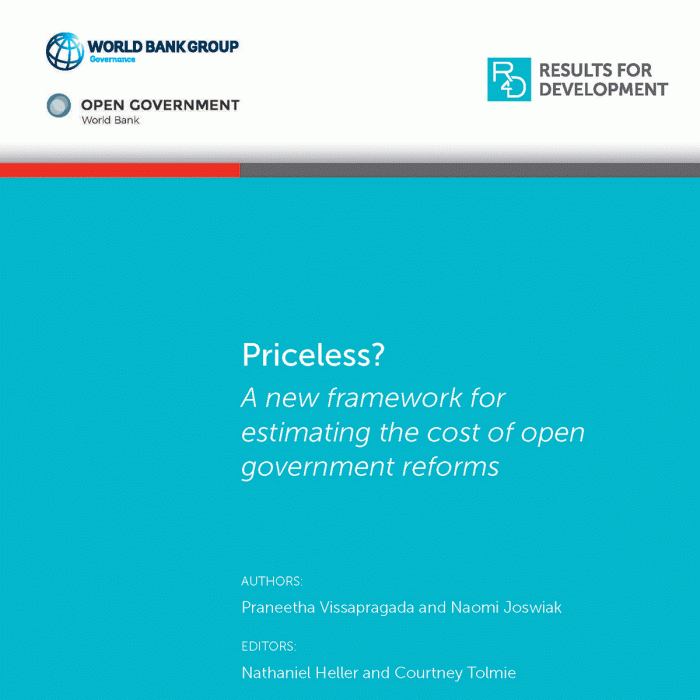WASHINGTON, D.C. — Results for Development (R4D) has released a pioneering new framework to accurately conduct costing analyses of open government reforms. For open government donors and implementers, these novel costing techniques — adapted from proven methods in health, education and nutrition — help to identify the major cost drivers of open government reforms.
The new resource, Priceless? A New Framework for Estimating the Cost of Open Government Reforms, was developed in collaboration with the World Bank’s Open Government Global Solutions Group and the Governance Global Practice. The framework introduces six steps for conducting a costing study, including: (1) Defining the scope of the program; (2) Identifying types of costs to assess; (3) Developing a framework for costing; (4) Identifying key components; (5) Conducting data collection; and (6) Conducting data analysis.
“This is the first time that anyone has attempted to generate comprehensive estimates of the full economic investments required to embrace open government reform initiatives,” Nathaniel Heller, executive vice president for integrated strategies at Results for Development. “When combined with downstream impact evaluations assessing the benefits of embracing open government, we can begin to accurately pinpoint the true return on investment from opening up public sector processes and functions. For years, the open government community has lagged behind other sectors in understanding this return on investment; the release of these new costing methods will help us to close the gap.”
The report also includes two case studies where the new costing methods were applied; one focuses on ProZorro, an e-procurement program in Ukraine, and the other on Sierra Leone’s national open data portal. Both case studies provide an initial baseline price tag of quintessential open government reforms and provide context for future open government reforms in other countries.
“Costing has never before been done in the open government field, which leaves a large gap in data for these type of reforms,” said Praneetha Vissapragada, senior program associate at Results for Development. “Adopting methodologies and frameworks from the Health, Nutrition and Education sectors, we developed a set of resources, tools and lessons learned to allows us to take a first step in filling these data gaps as a community.”
When used as a resource for planning, budgeting and advocating for open government, this work has the potential to vastly improve the design and implementation of open government programs as well as the sequencing and rationalization of reform efforts.
###
About Results for Development
Results for Development (R4D) is a leading non-profit global development partner. We collaborate with change agents around the world — government officials, civil society leaders and social innovators — to create strong systems that support healthy, educated people. We help our partners move from knowing their goal to knowing how to reach it. We combine global expertise in health, education and nutrition with analytic rigor, practical support for decision-making and implementation and access to peer problem-solving networks. Together with our partners, we build self-sustaining systems that serve everyone and deliver lasting results. Then we share what we learn so others can achieve results for development, too. For more information, visit our website at: www.r4d.org.
Homepage photo © Kevin Dooley
News feature photo © Simon Davis/DFID














